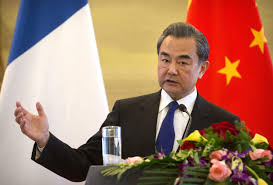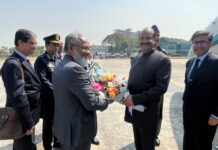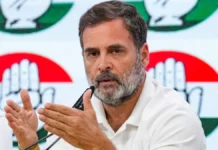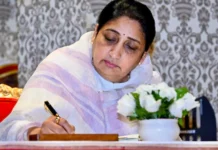 BEIJING: China and India should shed their mental inhibitions and manage differences to enhance bilateral ties, Chinese Foreign Minister Wang Yi said today and insisted that even the Himalayas cannot stop the two countries from friendly exchanges if there is political trust.
BEIJING: China and India should shed their mental inhibitions and manage differences to enhance bilateral ties, Chinese Foreign Minister Wang Yi said today and insisted that even the Himalayas cannot stop the two countries from friendly exchanges if there is political trust.
Wang’s remarks on Sino-India relations came during his annual press conference on the sidelines of the ongoing parliamentary session.
Asked how China views relations with India this year after turbulence in ties in 2017 due to a number of issues including the Dokalam standoff, Wang said, “Despite some tests and difficulties, the China-India relationship continues to grow”.
Bilateral ties were affected by a number of issues last year, including the China-Pakistan Economic Corridor, China blocking efforts at the UN to list Pakistan-based Jaish-e-Mohammed chief Masood Azhar as a global terrorist as well as India’s entry into the Nuclear Suppliers Group.
Troops of India and China were locked in a 73-day-long standoff in Dokalam. The standoff ended on August 28 after the Chinese military stopped road building close to the strategic Chicken Neck corridor in an area claimed by Bhutan.
Wang, however, said the two countries must shed mental inhibitions, manage differences and meet each other half way.
“China is upholding its rights and legitimate interests and taking care to preserve the relationship with India,” he said.
“Chinese and Indian leaders have developed a strategic vision for the future of our relations. The Chinese dragon and Indian elephant must not fight each other but dance with each other,” he said.
“If China and India are united, one plus one will become eleven instead of two,” he said.
Wang said the international situation is experiencing its biggest change in a century and China and India must do everything to emphasize this and support each other and avoid mutual suspicion and attrition.
He said mutual trust is the most precious commodity in the China-India relations.
“With political trust, not even the Himalayas can stop us from friendly exchanges. Without it, not even level land can bring us together,” he said.
“A shared understanding far outstrips our differences. Our common interests far outweigh our frictions. China is willing and ready to inherit and take forward our traditional friendship and be a friend and partner of Indian people.
“I hope the two sides will be free from mental inhibitions and meet each other halfway. Let us replace suspicion with trust, manage differences with dialogue and build a future with cooperation,” he said.
Wang reacted strongly to a question whether the Indo-Pacific strategy being furthered by India, the US, Japan and Australia will affect China’s Belt and Road Initiative (BRI).
He said there was “no shortage of headline grabbing ideas” but they were “like the foam on the sea” that “get attention but will soon dissipate”.
Contrary to claims made by some academics and media outlets that the strategy is aimed at containing China, the four countries have made it clear that it targets no one, Wang said.
“I hope they mean what they say,” he said. “Let us not forget the BRI has received the support of over 100 countries. Nowadays stroking a new Cold War is out of sync with the times and inciting confrontation will find no market,” he said.
Touted as Chinese President Xi Jinping’s ambitious project, the BRI focuses on improving connectivity and cooperation among Asian countries, Africa, China and Europe.
The BRI also includes the China-Pakistan Economic Corridor (CPEC) which India opposed as it goes through Pakistan-occupied Kashmir.-PTI






